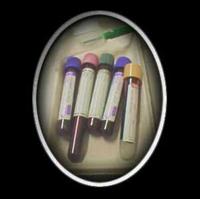GUINEA-BISSAU: Testing without treatment: an island's dilemma

Saico Djau is a very frustrated laboratory technician and HIV counsellor. After testing people for HIV and informing them of their status there is nothing else he can do for them if they are HIV-positive, because there is no antiretroviral (ARV) treatment available on Guinea Bissau's Bijagos Islands.
He has to give them the bad news and then send them back to their villages. In the case of pregnant women, they go with the likelihood that they will pass the virus to their babies. "I feel bad about it," a distressed Djau told IRIN/PlusNews. "I have no way of helping a pregnant woman have a healthy baby."
Djau works at the Marcelino Banca hospital on Bubaque Island, the second largest in the Bijagos Archipelago of over 80 islands, home to some 35,000 people.Bissau, the capital on the mainland, is five or six hours away by piroga (motorised canoe) at a price that few of Bubaque's impoverished residents can afford, but ARVs are only available in the capital and two other neighbouring towns on the mainland.
"To go to Bissau for treatment? Impossible, for economic and psychological reasons. If the national AIDS programme wants good results, it cannot expect locals to go to Bissau," said Djau.
A hundred metres from Djau's basic testing and counselling room is the tuberculosis (TB) ward, where nurse Joao Domingos is equally frustrated. Many of the TB patients are also HIV-positive. After treating them for TB, Domingos sends them home with anti-TB pills and food parcels, knowing that the TB may be cured, but another opportunistic infection will strike.
So many problems
Testing without providing treatment was common across sub-Saharan Africa 10 years ago, when the price of ARVs put them beyond the dreams of most. Today, cheap ARVS and the money to roll them out have become more widely available.
But not in Guinea Bissau. In this country of 1.4 million people, with an HIV-prevalence rate of around four percent, services to prevent mother-to-child transmission of HIV are available only in the capital; as of November 2007, 776 people were on ARVs, more than half in the capital.
"Ideally, the whole package of testing and treating should be implemented throughout the country, but many factors militate against this. We can't wait to have everything in place to start testing," said Magda Queta, of the National Secretariat for the Fight against AIDS.
Adrien Were, the Bissau representative of Global Fund to fight HIV/AIDS, TB and Malaria, explained that his organisation and the World Bank pooled resources for AIDS in five priority regions, leaving the remaining six - the Bijagos Archipelago among them - for other donors at a later stage.
But even in the priority regions the response was sluggish, and although there was money to buy materials, getting them to Guinea Bissau was fraught with difficulty. Were listed coordination, monitoring and logistics as the main problems.
There is only one weekly flight from Portugal and one daily from neighbouring Senegal, and the life-prolonging medicines were delayed at the Lisbon and Dakar airports; transporting anything by ship was worse, because shipping agents confused Guinea Bissau, Guinea Conakry and Equatorial Guinea. "This is a huge problem for us," he added.
Viral load tests, which measure the quantity of HI virus in the system, cannot be done in the country; CD4 counts, which measure the strength of the immune system, can only be done in the capital.
A nurse with 38 years of experience, such as Domingos, earns CFA 27,900 (US$66) a month, and civil servants' salaries are sometimes paid three our four months late - often after they go on strike and take to the streets.
"There are so many, so many, so many problems," Paula Luaces, monitoring and evaluation officer for the Global Fund, told IRIN/PlusNews.
Few people are tested
Djau said few people on Bubaque dared to be tested out of fear, ignorance and the lack of ARVs. Although a handful of young men had been tested, most people who had learnt of their status were pregnant women and TB patients whose doctors advised them to do so.
He keeps neat statistics but has not sent any to the capital in the last six months. In March, when he was trained to do HIV testing in Bissau, he received report forms for three months, but no more have arrived since then. To send the monthly reports he would have to pay for photocopies of the forms out of his own pocket. "At CFA100 (US$0,20) each, I can't afford it," he said.
The frustration of Djau and Domingos mirrors that of HIV-positive patients and their caregivers. "To know you are HIV-positive, while not having access to any support or treatment may make your health worse," said Indira Gomes Sambú, head of INDE, a Portuguese non-governmental organisation that provides home-based care in the capital.
On the other hand, she said, it was a good idea to test people: "An HIV-positive person who understands AIDS will be careful not to infect others."
 Back and Next - Back and Next
Back and Next - Back and Next See Also - See Also
See Also - See Also